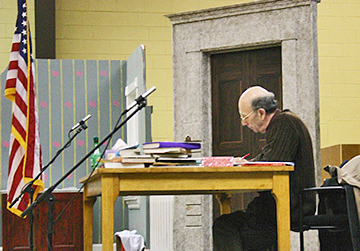
|
|
Vol. LXIII, No. 16
|
|
Wednesday, April 22, 2009
|
 Francesco Perrulli
|
Francesco Perrulli has worn many hats over the years. After his ordination as a priest, he worked as a missionary in Chile, where he helped compesinos (farmers and cowboys) set up schools and clinics in the hills and vineyards. Back in the states, he created a training program for New York City hotel workers, helping waiters and bellboys upgrade their jobs. Still later, he chaired the foreign language department at Princeton Day School. Along the way he accumulated more than 200 postgraduate credits in education; the equivalent, he likes to point out, of three doctorates. He now puts these to good use at the Princeton Latin Academy, a kindergarten through eighth-grade school where, as founder/director/teacher, this exuberant educator is known as “Magister.”
I take risks. I started the Princeton Latin Academy in 1988. I wanted to create a sane environment for children. Too much pressure has been put on children; there is not enough pedagogy. People have no idea how to teach children. We provide a classical education, teaching ancient Latin and Greek starting in Kindergarten. Why? American government is based on Greek and Latin thought: “congress” means to come together; “senator” refers to “old man,” implying wisdom. These are the roots of our society; if you destroy the roots the tree will die.
Parents want guarantees, but what you really want to do is to teach children to learn: to have an open mind and heart. This [pointing to his head] is very important; it’s a child’s private property. There is a Marxist movement afoot today which I will fight until I die. Children are not to be brainwashed.
The Heart of the Matter
We’re in an educational crisis. Politicians should not be in charge of education; educators should. Many people think the problem with schools has to do with math and science; it’s become a mantra. The crisis is in language, and it has to do with syntax and semantics, the form and meaning of language. Today’s philosophy holds that language isn’t important, and this is very dangerous. Syntax and grammar went out the window in the 1960s when students took over education and “relevancy” became the key word. If the students had really wanted to protest they would have opened a book.
Syntax, grammar, and ratiocinative thought (the logic of math) inform the school’s curriculum. They are not at war with each other; they are essential to education, and math should not be put above language. Saying “I’m a math person” is foolish. You’d better be a person first.
Good Value
Tuition at the Latin Academy is about half of what it is at other area private schools: I like to say that you get twice the education for half the price here. The eight teachers who work here are my endowment. Children need healthy adults, who do not abdicate being adults, as teachers. The school office is in the gym, and teachers are there every day from 3 to 3:40 p.m. to speak to parents. Parents can, and do, call me any time, including evenings. When parents sign a financial contract to send their child to the Princeton Latin Academy, we put it away and establish a covenant, what I call the “sacred triad.” We do not interfere with the “pietas,” the love between a parent and a child, and parents don’t interfere with the mentoring relationship that exists between teachers and students. That way, everyone knows his place. It works. The emphasis here is on what is human.
There are currently 40 students at the school. The ideal would be 80. We’re not known, but the parents are out there. I hope we can find them.
To find out more about the Princeton Latin Academy, see www.princetonlatinacademy.com/.